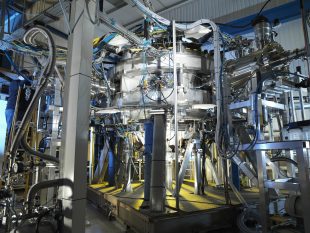Guest post by Dr David Kingham, Executive Vice Chairman at Tokamak Energy.
This article is part of the Green GB Week blog post series.

Reliance on fossil fuels is one of the major obstacles we need to overcome to minimise the significant economic, social and environmental threats posed by global climate change.
Almost every country in the world remains reliant on fuels like crude oil, coal and natural gas – with potentially devastating consequences.
This month, in the most extensive warning of the risks of global temperature to date, the IPCC’s special report on the impact of global warming urged that warming be limited to 1.5 degrees Celsius.
Radical changes to the energy system will be required to remain under this critical point – meaning a leap forward in renewable energy technology, or something else entirely.
The good news is that the government and private companies are together taking strides towards this.
There has been marked progress in the uptake of renewable energy sources with the utilisation of technology like wind and solar power now producing more than 20% of the UK’s electricity.
But these sources on their own cannot provide enough electricity to power all of the homes and businesses in the UK. Furthermore, their electricity generation depends on the wind and the sun – two unpredictable forces of nature.
Rather, we need to change the way we generate power forever to keep the Earth’s rising temperatures under control.
Tackling rising temperatures with renewable energy
To reduce greenhouse gas emissions sufficiently, we must utilise the science and engineering expertise in the UK to develop new energy technology that is safe, clean, and cost effective.
Our solution to this challenge is fusion energy.
Fusion is the joining together of small atomic nuclei to form larger ones, releasing huge amounts of energy. It involves forcing together these nuclei that would ordinarily repel and so requires temperatures around 100 million degrees Celsius to initiate the reaction.
At these high temperatures, the fuel is in a “plasma” state (an electrically-charged gas) and controlling this plasma is key to the fusion process.
The Tokamak Energy approach combines compact, spherical tokamaks with high temperature superconductor magnets to do this, providing one of the most promising routes to commercial fusion energy.
The government has recently funded a feasibility study into the Tokamak Energy approach as part of the Advanced Modular Reactor (AMR) Feasibility and Development (F&D) project.
This formed part of a wider investment from the Department for Business, Energy and Industrial Strategy into clean energy and enhances the world-leading position of UK fusion research.
The future of fusion
Tokamak Energy is building on the country’s expertise in fusion and high temperature superconductor magnets to deliver real, essential change.
Fusion will provide the world with a base-load power source that is clean, safe and abundant. It produces no greenhouse gases, no long-lived nuclear waste, and the fuel – hydrogen – is globally accessible.
Here in the UK, we have the scientific foundations and the engineering expertise to succeed in commercialising fusion energy.
With the rise of private fusion companies there is an incredible business opportunity in this expanding area of clean growth, one which we hope will see rapid progress to secure environmental and energy security benefits for future generations.
